新视野第二册电子教案Unit 2
- 格式:doc
- 大小:66.00 KB
- 文档页数:9

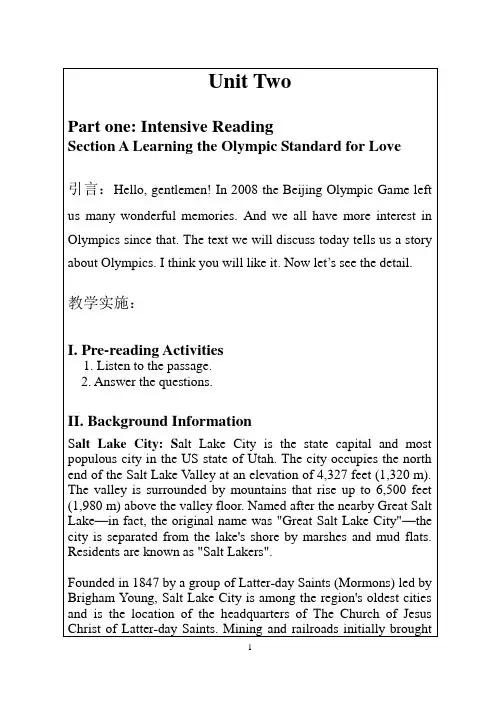
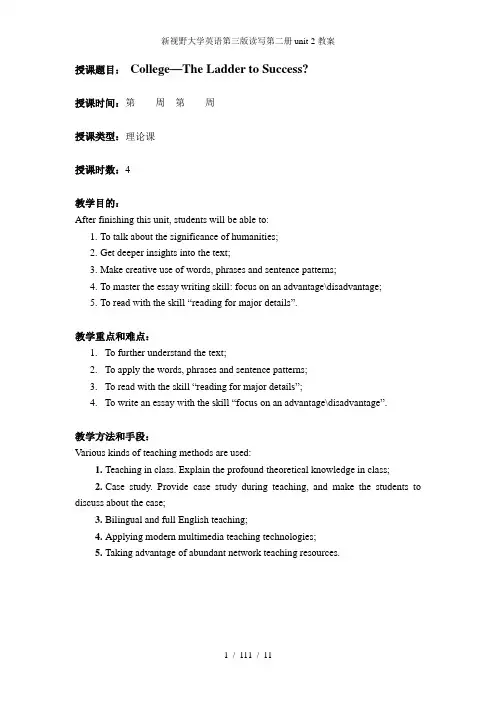
授课题目:College—The Ladder to Success?授课时间:第____周第____周授课类型:理论课授课时数:4教学目的:After finishing this unit, students will be able to:1.To talk about the significance of humanities;2.Get deeper insights into the text;3.Make creative use of words, phrases and sentence patterns;4.To master the essay writing skill: focus on an advantage\disadvantage;5.To read with the skill “reading for major details”.教学重点和难点:1.To further understand the text;2.To apply the words, phrases and sentence patterns;3.To read with the skill “reading for major details”;4.To write an essay with the skill “focus on an advantage\disadvantage”.教学方法和手段:Various kinds of teaching methods are used:1.Teaching in class. Explain the profound theoretical knowledge in class;2.Case study. Provide case study during teaching, and make the students to discuss about the case;3.Bilingual and full English teaching;4.Applying modern multimedia teaching technologies;5.Taking advantage of abundant network teaching resources.教学内容和过程:Section A The humanities: Out of date?Step One Warming-up Activities 30 minutesI.Lead-in:Discuss the following questions:1.How do you think of your current major? If you were given a second chance to choose your major, what would you select and why?— If I were given a second chance to choose my major, I would choose …/ I think being a … is …— accounting, computer science, psychology,—civil engineering, philosophy, medical technology …—popular, interesting, enjoyable, promising, practical, meaningful, beneficial, well-pa id …2. What liberal arts / humanities courses do you learn in college? Do you think they are necessary for your education?—I learn Chinese, English, philosophy, psychology, history … in college. I think they are an essential part of the college education and benefit me a lot.• gain more insight in life and society• better understand and predict human behavior• realize different interpretations of life and history• understand the past which has created the present• be aware of cultural a nd religious differencesII.Cultural background1. What are the humanities?The humanities are a group of academic disciplines that study the human condition, using methods that are primarily analytical, critical, or speculative. Therefore, they are distinguished from the approaches of natural sciences. The humanities, called social sciences, include history, anthropology, communication studies, cultural studies, law, linguistics, etc.2. Why are the humanities important?Through exploration of the humanities, students learn how to think creativelyand critically, to reason, and to ask questions. Because these skills allow students to gain new insights into everything from poetry and paintings to business models and politics, humanistic subjects have been at the heart of a liberal arts education. Today, humanistic knowledge continues to provide the ideal foundation for exploring and understanding the human experience.Step Two Text Study 80 minutesI.Interactive reading of the text1. Reading comprehension1)Why do many students calculate they can’t major in English or history?2)Why does the author say that a college education is more and more seen as ameans for economic betterment rather than a means for human betterment?3)How do you understand “These days, labs are more vivid and compellingthan libraries” (Para. 3)?4)Why does the author say that the inner aspect of our being has captured ourimagination from the very beginning?5)According to the author, what are the advantages of studying the humanities?6)What are “well-rounded human beings” (Para. 10) according to the author?2. Structure of the textPart 1 (Para, 1-5) IntroductionTo improve their future chances of finding a job, college students are now moving away from the humanities and taking accounting or some “hard-skill” courses. The humanities will continue to be in bad shape due to the economic downturn. Nevertheless, the humanities can bring true value to people’s lives, and the basis of study of the humanities is formed by the inner power that has driven human beings to either greatness or destruction.Part 2 (Para. 6-9) Body: Why the humanities?This part presents the author’s argument to stand up for the true value that the humanities bring to people’s lives.Part 3 (Para 10) Concluding partThe humanities help to create human beings with insight and understanding of the passions, hopes and dreams common to all humanity. The humanities will never be out of date. They are as useful and relevant in our modern age as they have alwaysbeen.3. Summary of the TextRetell the text according to the following tips.1)(Part I) When the job market worsens, many students calculate ... Probably, the humanities will continue …. Once …, the humanities now …2)(Part II) Here, please allow me to … that the humanities add to people’s lives. Studying the humanities improves… Most importantly, studying the humanities invests us with …, thereby… Perhaps the best argument in favor of the humanities is… In fact, increasingly… is seen as the ideal in…3)(Part III) In summ ary, the humanities help to create …, teach us to … and… It makes sense to …, our outstanding and remarkable …nguage FocusWords and expressions1. when the going gets tough: when the situation becomes difficultWhen the going gets tough, women can get as tough as men.当形势变得严峻时,女人可以变得跟男人一样坚强。
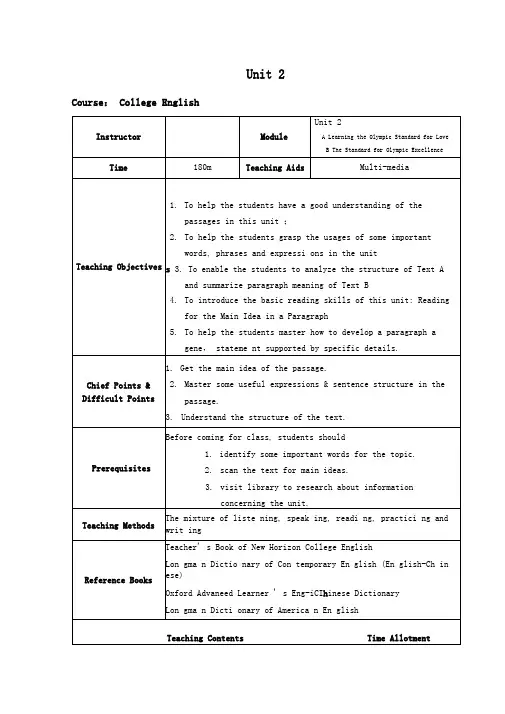
Unit 2 Course: College EnglishSectio n AI.Warm-up Activity1.Topic Discussioni.Student ' s Discussionii.Teacher' s Summary2.Questions on the Topic and the PassageII.Backgro und In formati on I. Text Structure An alysis IV.S tructured WritingV.Detailed Study of the Texti.Words and Phrases Studynguage PointsVI.T ext Summary1.Student ' s Presentation2.Teacher' s SummaryVII . After-text A ExercisesSection BI.Readi ng SkillII.Warm-up Activity1.Topic Discussion2.Questions on the Topic and the PassageIII.Text Structure An alysisIV.T ext Study1.Paragraph Meaning2.Words and Phrases Studyn guage Points4.Summary or Main Idea of the Passagei.Student ' s Presentationii.Teacher' s SummaryV.New Words DictationVI.A fter-text B ExercisesVII . Supplementary exercises 15m5m 10m 5m 50m5m 30m5m 10m5m 20m5m 15mSection A Learning the Olympic Standard for LoveI.W arm-up Activity1.Topic Discussioni.Student' s Discussion1)Do you understand the meaning of commitment?——It means you are willi ng to sacrifice everyth ng you have in order to achieve great ness in one specific area.2)What is most important in the making of an excellent athlete?—Sportsma nship, commitme nt, the passi on to win3)How do you understand love?—Love is giving.Love is shari ng.Love is mom ' s kiss and dad ' s pat.Love is sweet roses to a lover and ten der caresses to a child.Love is the tree of frie ndship.Love is mutual un dersta nding and support.Love is forgive ness and sacrifice.Love is the n ever-setti ng sun in the sky.Love is the spri ng of the in spirati on.Love is the can dle in the dark and the fireplace in the cold.Love is a key to ope n the door of a closed heart.Love is an oasis on a boun dless desert which gives a tired walker stre ngth andhope.Love is a harbor in a turbulent sea which makes a weary seaman safe and sou nd.Love is a kind of subtle and precious sensation among human beings. Love is all.ii.Teacher' s SummaryFor some athletes, the passi on to win at sports is greater tha n anything else.However, there is more to be a true Olympian than just competing to win. To trulyachieve glory one must also uphold the highest sta ndard of sportsma nship and serveas a role model for other people.2.Questions on the Topic and the Passage1)As a self-confident amateur skier, the writer was already thinking ofparticipating in the Olympics before she met Nokolai, wasn't she?― No. Actually she was quite surprised when Nokolai suggested that.2)How would you describe the training sessionsafter Nokolai began to coach thewriter?― They went through a lot of hard training sessions full of pain and tears. Yet the training was really productive.3)Did Nokolai himself try very hard at skiing when he was young?—Yes, he did. He was always practici ng while others were relaxi ng themselves.4)How would you describe the relationship between the writer and her coach?— In training, they were strict coach and determined athlete; at other times, theywere on good terms with each other, like friends..5)What did the writer learn from Nokolai?—Besides improving her skills under Nokolai's instruction, she also learned theimportance of determination with courage, heart, and discipline; most important ofall, she learned to be thankful and loving while living in this world.II.Background Information1.Salt Lake City is the state capital and most populous city in the US state of Utah.The city occupies the north end of the Salt Lake Valley at an elevation of 4,327 feet (1,320 m). The valley is surrounded by mountains that rise up to 6,500 feet (1,980 m) above the valley floor. Named after the nearby Great Salt Lak—e in fact, the original name was “GreaStalt Lake City ”—the city i s eparated from the lake 's shore bymarshes and mud flats. Resiednts are known as “Salt Lakers ”. Founded in 1847 by a group of Latter-day Saints (Mormons) led by Brigham Young, Salt Lake City isamong the region's oldest cities and is the location of the headquartersof The Church of Jesus Christ of Latter-day Saints. Mining and railroads initially brought economic growth, and the city became known as the “Crossroads of the West ”. Thecity has developed a strong tourism industry and was host to the 2002 Winter Olympics.2.Carl Lewis, the greatest and most famous athlete of the last century, won 9 Olympic gold medals in four different events (100m, 200m, long jump and 4 x 100m relay). Carl Lewis was born on 1st July 1961 in Birmingham, Alabama. Since his first years of life he could breathe the soft and clean air of sport: His father used to train athletes at universities and his mother was 6th at 80m hurdles in the Pan-American games of 1951. He saw the Olympic Games of 1968 on TV and admired Bob Beamon. He was so impressed that after Beamon 's jump of 8.90m, hewent out with a friend to take the length of a limousine in order to realize how farBob flied! But for the moment, Carl was so thin that the doctor suggested making him do sports. His education, beyond studies, embraced a lot of fields. He learned to play musical instruments, to dance, to sing and applied himself to a large variety of sports: football, soccer, diving and, obviously, track and field.Amazingly, his father was a friend of Jesse Owens and so Carl grew up under the legend of this man, who won four gold medals in the Olympic Games of Berlin in 1936. Carl began with long jump and after a competition, at the age of 10, he was awarded by Owens himself. At the age of 13 he jumped 5.51m and when he was 17, 7.85m. Trainers pointed him out as a young promise. In fact, in 1979 he was allowed to join the national team and to take part in the Pan-Americangames in San Juan, Puerto Rico. He placed third with 8.13m on his last jump. Meanwhile, he spent part of his time training for the 100m and in 1979 he ran this in 10.67 seconds.3.Ben Johnson was born in Falmouth, Jamaica on 30 December, 1961. He emigrated to Canada in 1976. Ben made his debut at a major international tournament in the 100m at the 1983 World Championships, where he was eliminated in the semi-finals. The following year, Ben Johnson reached the final of the 100m at the 1984 Summer Olympics in Los Angeles, finishing third behind Carl Lewis. With the Can adia n 4 lOOrtKrelay team, he won a sec ond bronze medal. At the 1987 World Championships, in Rome, Johnson gained instant world fame when he beat Lewis for the title, setting a new world record of 9.83 seconds as well. Johnson and Lewis were also the favorites for the 1988 Olympic title. In the final, Johnson beat Lewis, clocking a new world record of 9.79 seconds. A few days later, however, Johnson's urine samples were found to contain steroids, and he was disqualified for doping.III.T ext Structure AnalysisThe passage is a first-narration about the writer's training experiences for Olympic Games with an ex-Soviet coach, through which the writer learned the Olympic standard for love. The whole passage can be roughly divided into four parts.Part One (Para. 1-4) The first two paragraphs are an introduction to the ex-Soviet coach, Mikolai. Nokolai Petrovich Anikin was not half as intimidating as the writer had imagined he would be, bit the writer was very nervous in his presence. Paragraphs 3 and 4 are aboutNikola'is high expectations: He encouraged the writer to get ready for 2OO2 Olympics in Salt Lake City. Although this would require many hard training sessions, Nikolai was sure that the writer would improve and that she could be ready.Part Two (Para. 5-19) This part deals with the Olympic standard of love as shown by Nokolai. Paragraphs 5 to 9 set up an Olympic standard for love: encouragement mingled with good humor, quiet gratitude, perceptivity, and sincerity. Paragraph 5 tells us that the writer could always count on being encouraged by Nokolai 's amusing stories and senseof humor. Paragraphs6 to 8 are about the supporting details as to show the writer was encouraged by Nokolai's amusing stories and sense of humor, paragraph 9 could be taken as a conclusion for the part of encouragement.Paragraohs 10 and 11 deal with another aspect of the Olympic sta ndard for love: Nokolai was in differe nt to her pain and urged her to go on skii ng. Paragraph 12 and 13 are about ano ther aspect of Nokolai. Nokolai was strict about training while with other small things he did not take much notice of the writer ' compla ints or outbursts. He saved his passi on for skii ng. Paragraphs 14 to 19 are about still ano ther aspect of Nokolai: persiste nee and patie nee. Whe n coach ing, he told the writer to practice countless times to achieve perfection. Nokolai ' patience and the writer' s hard work at last earned her a fou-pHiace nati onal ranking head ing into the pre-Olympic seas on, but she missed the cut for the 2002 Olympic.Part Three (Para. 20) This is a transitional paragraph. This is the time when the writer stopped her trainin g, revisited her coach Nokolai, thought of what happe ned in the past, and realized that she had gained a lot from her quiet, in dissoluble bond with her coach Nokolai. Part Four (Para. 21) This is the conclusion of the whole passage」t summarizes what Nokolai taught the writer. She came to un dersta nd the Olympic sta ndard for love: to have thecourage, heart, discipline to persist, and to have gratitude in advance for a century of life on earth. She should remind herself every day that there must be love, love, love despite the challe nges at hand.IV.S tructured WritingA General Statement Followed by DetailsA com mon way to express an idea is to have a gen eral stateme nt followed by some details. Here we can study an analysis of Paragraph5 to Paragraph 9 to show how the general statement countless training sessions full of pain and more than a few tears were accompanied by encouragement and amusing stories^ is followed by details.(Let' come to Page 39 and do Exercise XIII)V.Detailed Study of the TextWords & Phrases Study1.patvt. touch sb. or sth. lightly and repeatedly with a flat hanc轻扌白She patted a place next to her for me to sit down. 她用手拍了拍旁边的地方叫我坐下。
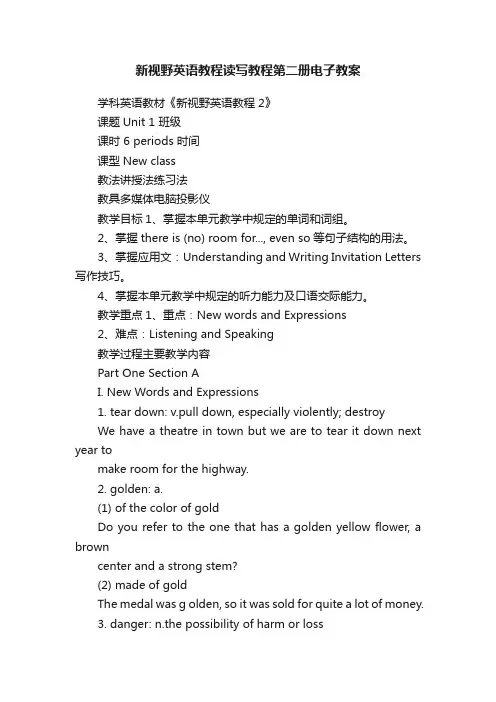
新视野英语教程读写教程第二册电子教案学科英语教材《新视野英语教程2》课题Unit 1 班级课时 6 periods 时间课型New class教法讲授法练习法教具多媒体电脑投影仪教学目标1、掌握本单元教学中规定的单词和词组。
2、掌握there is (no) room for..., even so等句子结构的用法。
3、掌握应用文:Understanding and Writing Invitation Letters 写作技巧。
4、掌握本单元教学中规定的听力能力及口语交际能力。
教学重点1、重点:New words and Expressions2、难点:Listening and Speaking教学过程主要教学内容Part One Section AI. New Words and Expressions1. tear down: v.pull down, especially violently; destroyWe have a theatre in town but we are to tear it down next year tomake room for the highway.2. golden: a.(1) of the color of goldDo you refer to the one that has a golden yellow flower, a browncenter and a strong stem?(2) made of goldThe medal was g olden, so it was sold for quite a lot of money.3. danger: n.the possibility of harm or lossA policeman could meet with danger any minute of his workingday.in danger of: likely to be hurt or damaged byThe trees in the forest have been cut down in such great numbersthat the forest is i n danger of d isappearing.4. line of thinking /thought: a way or method of thinking aboutsomethingI worry about this line of thinking because it is not good forchildren.5. resident:n.a person who lives in a placeThis hotel serves meals to residents o nly.a. Living in a placeIn 1970 about one fifth of resident college and university students were women.6. inspect: vt. examine closely or in detail, especially in order to judgequality or correctness; make an official visit to judge the qualityYesterday a man from the local education committee came to inspect o ur school.7. inspector: n.an official who inspect somethingThe tax inspector has a complete right to examine the company files.8. structure:n.(1) something formed of many parts, especially a building,The steel structure looks very strange among the small wooden houses.(2)the way in which parts are formed into a whole,Scientists now know quite a lot about the structure of the human brain.vt. Arrange into a whole form, in which each part is related to others It is difficult for me to understand why things are structure in sucha way in their family.9. claim:v.(1) declare to be true, stateOne should not claim to know what one doesn’t know.(2) ask for, take, or state that one should have something to whichone has a rightOn what grounds are you claiming compensation? You have to state reasons.n.(1)a statement that something that is true or realLots of people say that never read advertisements, but this claim is hard to believe.(2) a demand or request for something which one has a right to have,The workers have come out on strike in support of their pay claim.10. register:n.an official record or listAll stores which sell guns must keep a register showing the details of each deal.v.put into an official record or list,registered.They made sure that each book was numbered andII. Sentence Structure1. They are using the earthquake as an excuse.Meaning: The reason that the building was damaged in an earthquakewas not a real one: McDonald’s managers are using it to hide the realreason for tearing down the building.2. There is no room for a drive-thru window, or for seating inside.Meaning: There is no space where people can buy food without gettingout of their car. Nor is there space for people to sit and eat inside.3. The building is still there, but boards cover the windows. Even so;people drive by to remember their McDonald’s.Meaning: Although the windows of the restaurant are covered withboards, people still stop by to visit their McDonald’s when driving past i 4. Taking pictures of a moment in history the restaurant is gone.Meaning: They take pictures to record a time in history before therestaurant is gone.III. Questions About the Text1. Where and when was the first McDonald’s built?2. Why does McDonald’s want to tear down the restaurant?3. Why do some people want to save the first McDonald’s?4. What is McDonald’s real purpose to tear down the restaurant?5. What is the author’s purpose of writing this article?Part Three Section CPractical Writing:Understanding and Writing Invitation LettersPart Four Listening and Speaking1. What do you think about...?2. How do you like...?3. I like /love it. /I hate it.4. It’s great. /it’s horrible.Part Five Summary1. New Expressions2. Sentence Structure3. Practical Writing4. Listening and SpeakingPart Six HomeworkP9, 10, 11, 12, 17, 18, 20, 21.四、教学总结:1.本课A部分是关于麦当劳的文章,学生会比较感兴趣,由此可以多介绍英美国家的饮食,特别是快餐的情况。
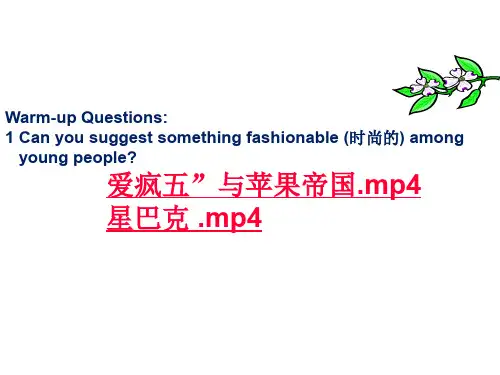
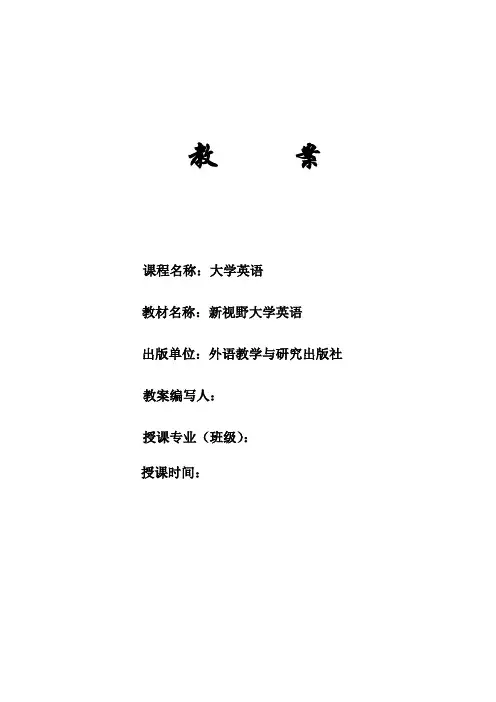
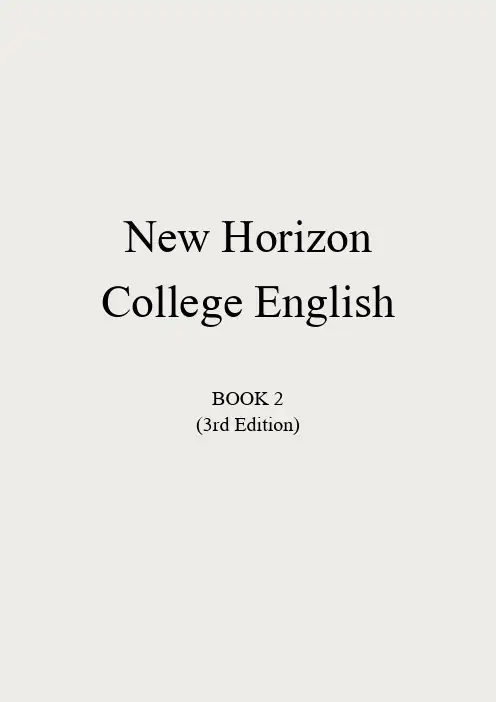
New Horizon College EnglishBOOK 2(3rd Edition)Unit 1 An Impressive English Lesson课型:□ 理论课√ 理论、实践课□ 实践课课时分配: 6教学环境:多媒体教室教学目标:After studying this unit, the students are expected to be able to:1. understand the main idea and structure of Section A and Section B;2. master the key language points and grammatical structures in the texts3. talk about language teaching and learning and express their opinions about current way of teaching in an English class;4. read with the skill ―finding key ideas in sentences;5. write a composition with three main parts: introduction, body and conclusion.Key Issues:1. VocabularyTedious, absorbed, allergic, capture, condense, exceed, distinguish, distinctive, complimentary, complementary, proclaim, evidently, adequate, competent, adjust, beneficial2. SkillsLearn to read with the skill ―finding key ideas in sentences and write a composition with three main parts: introduction, body and conclusion.Potential Problems and Difficulties●To talk about language teaching and learning●write a composition with three main parts: introduction, body and conclusion.●To apply the phrases and patternsMethodology:A combination of traditional teaching methods with the communicative approach will be adopted. Special attention should be paid to classroom interaction like questioning and answers. Small group works are always needed while discussing the questions and the difficult translation practice. More encouragement is needed and more guidance will be given in their extracurricular study.Teaching Aids: Visual aids, projector, stereo and microphoneGroup work and pair workConduct of Tasks and Activities(师生互动方式Mode of Interaction; 学习策略Learning Strategies)Students-centered, Task-based teaching and learningTeaching ProceduresStep 1 Lead-inI. Greeting and warming-up questions discussion.1. What are the key factors that help people learn English as a foreign language?2. Do you have any problem in English learning?3. Do you think grammar is important in English learning?II. Listening and discussing.1. Listening practice.2. In your opinion, what is the most effective way to learn English?III. Listening to a talk and answer questions on page 2Step 2 Section A An Impressive English LessonI. Cultural background American university education1.What is Communicative Language Teaching?A type of teaching method;Develop the communicative ability as well as the knowledge of grammar; Learning by doing;Make classroom situation of real foreign language environment.2. What are the features of Communicative Language Teaching?Communicative competence is the goal;An integration of grammatical and functional teaching;Accuracy is secondary to conveying a message;Focus on communicative and contextual factors in language use;Learner-centered and experience-based.3. What is the role of teacher in Communicative Language Teaching?A facilitator of students’ learning;A manager of classroom activities;An advisor of students’ questions;A co-communicator in the communicative activity.II. Language PointsWords and expressions1. oddity: n. [C] a strange or unusual person or thing 怪人;怪物;奇特的东西With his neat suits on, he felt like an oddity walking in this poor neighborhood. 穿着笔挺的西装走在这个贫民区里,他觉得自己就像个怪物。
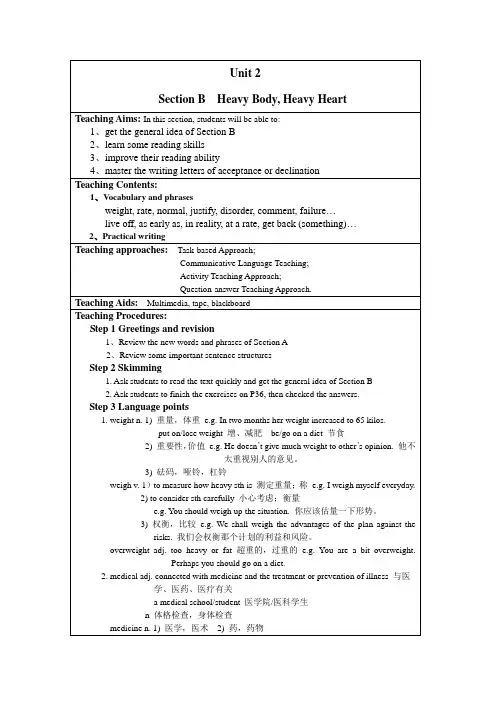

Unit 2 Course: College EnglishSectio n AI.Warm-up Activity1.Topic Discussioni.Student ' s Discussionii.Teacher' s Summary2.Questions on the Topic and the PassageII.Backgro und In formati on I. Text Structure An alysis IV.S tructured WritingV.Detailed Study of the Texti.Words and Phrases Studynguage PointsVI.T ext Summary1.Student ' s Presentation2.Teacher' s SummaryVII . After-text A ExercisesSection BI.Readi ng SkillII.Warm-up Activity1.Topic Discussion2.Questions on the Topic and the PassageIII.Text Structure An alysisIV.T ext Study1.Paragraph Meaning2.Words and Phrases Studyn guage Points4.Summary or Main Idea of the Passagei.Student ' s Presentationii.Teacher' s SummaryV.New Words DictationVI.A fter-text B ExercisesVII . Supplementary exercises 15m5m 10m 5m 50m5m 30m5m 10m5m 20m5m 15mSection A Learning the Olympic Standard for LoveI.W arm-up Activity1.Topic Discussioni.Student' s Discussion1)Do you understand the meaning of commitment?——It means you are willi ng to sacrifice everyth ng you have in order to achieve great ness in one specific area.2)What is most important in the making of an excellent athlete?—Sportsma nship, commitme nt, the passi on to win3)How do you understand love?—Love is giving.Love is shari ng.Love is mom ' s kiss and dad ' s pat.Love is sweet roses to a lover and ten der caresses to a child.Love is the tree of frie ndship.Love is mutual un dersta nding and support.Love is forgive ness and sacrifice.Love is the n ever-setti ng sun in the sky.Love is the spri ng of the in spirati on.Love is the can dle in the dark and the fireplace in the cold.Love is a key to ope n the door of a closed heart.Love is an oasis on a boun dless desert which gives a tired walker stre ngth andhope.Love is a harbor in a turbulent sea which makes a weary seaman safe and sou nd.Love is a kind of subtle and precious sensation among human beings. Love is all.ii.Teacher' s SummaryFor some athletes, the passi on to win at sports is greater tha n anything else.However, there is more to be a true Olympian than just competing to win. To trulyachieve glory one must also uphold the highest sta ndard of sportsma nship and serveas a role model for other people.2.Questions on the Topic and the Passage1)As a self-confident amateur skier, the writer was already thinking ofparticipating in the Olympics before she met Nokolai, wasn't she?― No. Actually she was quite surprised when Nokolai suggested that.2)How would you describe the training sessionsafter Nokolai began to coach thewriter?― They went through a lot of hard training sessions full of pain and tears. Yet the training was really productive.3)Did Nokolai himself try very hard at skiing when he was young?—Yes, he did. He was always practici ng while others were relaxi ng themselves.4)How would you describe the relationship between the writer and her coach?— In training, they were strict coach and determined athlete; at other times, theywere on good terms with each other, like friends..5)What did the writer learn from Nokolai?—Besides improving her skills under Nokolai's instruction, she also learned theimportance of determination with courage, heart, and discipline; most important ofall, she learned to be thankful and loving while living in this world.II.Background Information1.Salt Lake City is the state capital and most populous city in the US state of Utah.The city occupies the north end of the Salt Lake Valley at an elevation of 4,327 feet (1,320 m). The valley is surrounded by mountains that rise up to 6,500 feet (1,980 m) above the valley floor. Named after the nearby Great Salt Lak—e in fact, the original name was “GreaStalt Lake City ”—the city i s eparated from the lake 's shore bymarshes and mud flats. Resiednts are known as “Salt Lakers ”. Founded in 1847 by a group of Latter-day Saints (Mormons) led by Brigham Young, Salt Lake City isamong the region's oldest cities and is the location of the headquartersof The Church of Jesus Christ of Latter-day Saints. Mining and railroads initially brought economic growth, and the city became known as the “Crossroads of the West ”. Thecity has developed a strong tourism industry and was host to the 2002 Winter Olympics.2.Carl Lewis, the greatest and most famous athlete of the last century, won 9 Olympic gold medals in four different events (100m, 200m, long jump and 4 x 100m relay). Carl Lewis was born on 1st July 1961 in Birmingham, Alabama. Since his first years of life he could breathe the soft and clean air of sport: His father used to train athletes at universities and his mother was 6th at 80m hurdles in the Pan-American games of 1951. He saw the Olympic Games of 1968 on TV and admired Bob Beamon. He was so impressed that after Beamon 's jump of 8.90m, hewent out with a friend to take the length of a limousine in order to realize how farBob flied! But for the moment, Carl was so thin that the doctor suggested making him do sports. His education, beyond studies, embraced a lot of fields. He learned to play musical instruments, to dance, to sing and applied himself to a large variety of sports: football, soccer, diving and, obviously, track and field.Amazingly, his father was a friend of Jesse Owens and so Carl grew up under the legend of this man, who won four gold medals in the Olympic Games of Berlin in 1936. Carl began with long jump and after a competition, at the age of 10, he was awarded by Owens himself. At the age of 13 he jumped 5.51m and when he was 17, 7.85m. Trainers pointed him out as a young promise. In fact, in 1979 he was allowed to join the national team and to take part in the Pan-Americangames in San Juan, Puerto Rico. He placed third with 8.13m on his last jump. Meanwhile, he spent part of his time training for the 100m and in 1979 he ran this in 10.67 seconds.3.Ben Johnson was born in Falmouth, Jamaica on 30 December, 1961. He emigrated to Canada in 1976. Ben made his debut at a major international tournament in the 100m at the 1983 World Championships, where he was eliminated in the semi-finals. The following year, Ben Johnson reached the final of the 100m at the 1984 Summer Olympics in Los Angeles, finishing third behind Carl Lewis. With the Can adia n 4 lOOrtKrelay team, he won a sec ond bronze medal. At the 1987 World Championships, in Rome, Johnson gained instant world fame when he beat Lewis for the title, setting a new world record of 9.83 seconds as well. Johnson and Lewis were also the favorites for the 1988 Olympic title. In the final, Johnson beat Lewis, clocking a new world record of 9.79 seconds. A few days later, however, Johnson's urine samples were found to contain steroids, and he was disqualified for doping.III.T ext Structure AnalysisThe passage is a first-narration about the writer's training experiences for Olympic Games with an ex-Soviet coach, through which the writer learned the Olympic standard for love. The whole passage can be roughly divided into four parts.Part One (Para. 1-4) The first two paragraphs are an introduction to the ex-Soviet coach, Mikolai. Nokolai Petrovich Anikin was not half as intimidating as the writer had imagined he would be, bit the writer was very nervous in his presence. Paragraphs 3 and 4 are aboutNikola'is high expectations: He encouraged the writer to get ready for 2OO2 Olympics in Salt Lake City. Although this would require many hard training sessions, Nikolai was sure that the writer would improve and that she could be ready.Part Two (Para. 5-19) This part deals with the Olympic standard of love as shown by Nokolai. Paragraphs 5 to 9 set up an Olympic standard for love: encouragement mingled with good humor, quiet gratitude, perceptivity, and sincerity. Paragraph 5 tells us that the writer could always count on being encouraged by Nokolai 's amusing stories and senseof humor. Paragraphs6 to 8 are about the supporting details as to show the writer was encouraged by Nokolai's amusing stories and sense of humor, paragraph 9 could be taken as a conclusion for the part of encouragement.Paragraohs 10 and 11 deal with another aspect of the Olympic sta ndard for love: Nokolai was in differe nt to her pain and urged her to go on skii ng. Paragraph 12 and 13 are about ano ther aspect of Nokolai. Nokolai was strict about training while with other small things he did not take much notice of the writer ' compla ints or outbursts. He saved his passi on for skii ng. Paragraphs 14 to 19 are about still ano ther aspect of Nokolai: persiste nee and patie nee. Whe n coach ing, he told the writer to practice countless times to achieve perfection. Nokolai ' patience and the writer' s hard work at last earned her a fou-pHiace nati onal ranking head ing into the pre-Olympic seas on, but she missed the cut for the 2002 Olympic.Part Three (Para. 20) This is a transitional paragraph. This is the time when the writer stopped her trainin g, revisited her coach Nokolai, thought of what happe ned in the past, and realized that she had gained a lot from her quiet, in dissoluble bond with her coach Nokolai. Part Four (Para. 21) This is the conclusion of the whole passage」t summarizes what Nokolai taught the writer. She came to un dersta nd the Olympic sta ndard for love: to have thecourage, heart, discipline to persist, and to have gratitude in advance for a century of life on earth. She should remind herself every day that there must be love, love, love despite the challe nges at hand.IV.S tructured WritingA General Statement Followed by DetailsA com mon way to express an idea is to have a gen eral stateme nt followed by some details. Here we can study an analysis of Paragraph5 to Paragraph 9 to show how the general statement countless training sessions full of pain and more than a few tears were accompanied by encouragement and amusing stories^ is followed by details.(Let' come to Page 39 and do Exercise XIII)V.Detailed Study of the TextWords & Phrases Study1.patvt. touch sb. or sth. lightly and repeatedly with a flat hanc轻扌白She patted a place next to her for me to sit down. 她用手拍了拍旁边的地方叫我坐下。
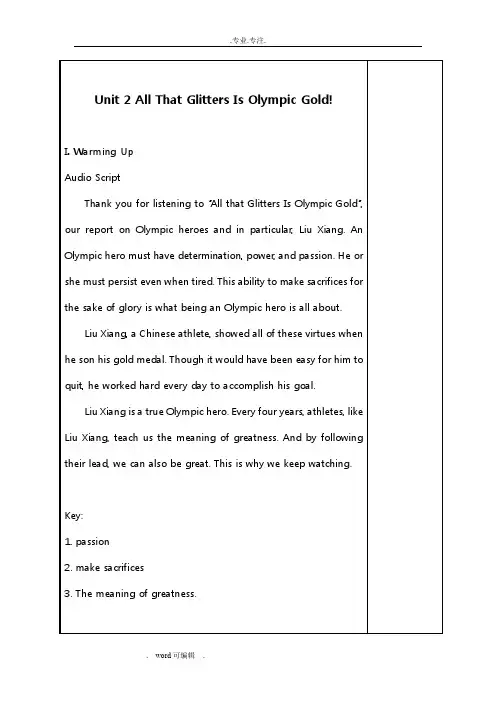
课型:理论课课时分配:2课时教学环境:多媒体教室教学目标:1. 知识目标:- 掌握课文中的核心词汇和短语。
- 理解课文的主要内容和中心思想。
- 掌握一定的语法知识。
2. 能力目标:- 培养学生的阅读理解能力,提高阅读速度。
- 培养学生的口语表达能力,提高口语交际能力。
- 培养学生的写作能力,提高写作水平。
3. 情感目标:- 激发学生对英语学习的兴趣,培养良好的学习习惯。
- 培养学生的跨文化交际意识,提高人文素养。
教学内容:1. 课文内容- Unit 1: Time Management- Unit 2: The Importance of Communication- Unit 3: Travel and Tourism- Unit 4: Environmental Protection- Unit 5: Science and Technology教学过程:第一课时一、导入1. 通过图片、视频等形式展示与课文内容相关的主题,激发学生的学习兴趣。
2. 提问:你们对时间管理、沟通、旅游、环保和科技等方面有什么看法?二、课文讲解1. 单词教学:讲解课文中的核心词汇和短语,并进行例句分析。
2. 语法教学:讲解课文中的语法知识,如时态、语态、非谓语动词等。
三、阅读理解1. 学生自读课文,完成课后练习题。
2. 教师讲解课后练习题,引导学生分析解题思路。
四、课堂小结1. 总结本节课所学内容,强调重点和难点。
2. 布置课后作业,巩固所学知识。
第二课时一、复习导入1. 回顾上一节课所学内容,提问学生掌握情况。
2. 引导学生回顾课文中的重点词汇和短语。
二、口语交际1. 学生分组讨论课文中的话题,如时间管理、沟通等。
2. 学生进行角色扮演,模拟实际场景进行口语交流。
三、写作训练1. 教师给出写作题目,如“谈谈你对环保的看法”。
2. 学生根据题目要求,进行写作练习。
3. 教师批改学生作文,并进行点评。
四、课堂小结1. 总结本节课所学内容,强调重点和难点。
Unit 2 Section A Swimming through fear教学重点:1. to learn to get the key idea and detailed information2. to understand the text with the questions given3. to translate some long and difficult sentences and learn some ways to expressone’s feeling (horror, relief, relaxation)4. to understand the problem-solution pattern教学难点:1 to separate the Chinese sentences and set the new sentence structure in English2.to grasp and translate some expressions and long sentences3.to learn the meaning of some detailed description4.to ask for and give directions5.教学过程:Task 1Lead-in (Ss work in groups to discuss the following questions)1. Did you experience some moments when you feared?2. How did you overcome the fear?3. Listening: pre-reading activities4. What can we infer from the title?Tips:1. A piece of narration (an event or a story)2.He or she was afraid of swimming.3.He or she succeeded in doing sth (according to “through”)Learn to swim?Task 2Text study1.Ss read the passage and discuss the following questions in groupsA. Why was Jason scared of water?B.Could the would-be rescuers succeed in saving the drowning boy? Why or why not?C. Why did Jason decide to intervene to save the boy in spite of his fear ofwater?D. Why did Jason become hesitant when he raced down the beach, out onto the jetty?E. How did Jason feel when he jumped into the water?F. How did the boy respond when Jason grabbed him?G. Was Jason's swimming back to safety smooth? Why?H. Why did Jason feel the water had never looked so beautiful when he reached the jetty?nguage focusSs read the passage and try to find out all new words and phrases of this unit.1)take \ hold sb. captive2)turn sb./ sth . down3)embark on/ upon sth.4)Share in sth.5)lead by example6)be stricken by/ with7)live onTask 3A paragraph of problem-solution patternWriting tips:I. IntroductionEstablishes the plot ( setting, characters, and time period )II. BodyFirst major eventSecond part of the storyThird part …Climax, the high point in the narrativeResolution in which the conflict / tension is resolved.III. ConclusionWhat is "the moral of the story?"Assignment:Write a paragraph of no less than 200 words on the following topic: slow downTask 4Listening partA. Discuss the following questions.1.talk about your own traveling experiences2.Make a plan for a dream journey3.what do you like about traveling?4.what don’t you like about traveling?B. listening to the following parts: sharing,opening up,viewing, speaking for communication part, further practice for listening。
教案教学系公共教学部教研室外语教研室启用时间2011年3 月教师刘畅通辽职业学院《新视野英语教程-读写教程2》教学计划课程名称:新视野英语教程-读写教程2学时/学分:4课时/周适用专业:财经管理学院三年制开课教学系:公共教学部开课教研室:外语教研室一、课程性质与任务1.课程性质:本课程是师范教学系的公共课。
2.课程任务:(1)了解:要求学生对其中贴近学生生活,关注时代热点,反映时代节奏,具有一定深意的选材有所了解。
(2)掌握:课后练习紧扣课文内容,包括词汇、语法、翻译、写作、阅读技能、完型填空等项,既注重各项能力训练之间的衔接和互补,也注重篇章层次上的一体化技能培训。
(3)重点掌握:编在Section A中的 Basic Writing Skills旨在巩固学生的语法知识,提高学生的基本写作能力;Section C为Practical Writing部分,目的在于培养学生阅读、写作、翻译应用文的能力,内容包括表格、名片、贺卡、简历、信函、广告、公告及产品介绍等。
二、课程教学基本要求理论课时-----64课时/班,无实践或实验成绩考核-----闭卷形式平时成绩占期末总分的50%,期末成绩占50%。
三、课程教学内容《新视野英语教程-读写教程2》是我院10级英语班专业必修课,以《大学英语课程教学大纲》及《专科英语基本要求》所规定的教学目标为依据,根据我院学生的实际情况制定了《职业学院〈新视野英语教程-读写教程2〉教学大纲》。
本课程内容涉及政治、经济、社会、语言、文学、文化和教育等方面,题材和内容丰富多样,并具有一定的启发性,实用性可以培养学生语言交际能力,扩大知识面,使学生了解不同社会的文化背景及人文知识的差异。
(一)每学期或每学年的教学进度参照教务处教学计划。
(二) 第二学期教学安排如下:完成第二册的7个单元。
每单元约用8学时要注意让学生作一些英译汉和简短答问的练习。
进行听力训练,教材课后练习的内容将纳入期末考试。
教学目标:1. 通过阅读和听力练习,提高学生的英语阅读和听力理解能力。
2. 培养学生分析、思考和表达的能力。
3. 引导学生了解不同文化背景下的人际交往和沟通方式。
教学重点:1. 词汇:掌握课文中的重点词汇和短语。
2. 语法:学习虚拟语气和条件状语从句的用法。
3. 阅读理解:提高学生的阅读速度和理解能力。
教学难点:1. 虚拟语气和条件状语从句的运用。
2. 对不同文化背景下的人际交往和沟通方式的理解。
教学过程:一、导入1. 引导学生回顾上一节课的学习内容,复习重点词汇和短语。
2. 提问:同学们,上一节课我们学习了哪些内容?你们觉得在与人交往时,沟通方式的重要性体现在哪里?二、阅读理解1. 预测:根据课文标题,预测课文可能涉及的内容。
2. 阅读课文,完成以下任务:a. 快速阅读,了解课文大意。
b. 精细阅读,回答问题。
c. 分析课文中的文化差异和沟通方式。
三、词汇学习1. 列举课文中的重点词汇和短语,并解释其意思。
2. 通过例句,让学生学会运用这些词汇和短语。
四、语法讲解1. 虚拟语气:讲解虚拟语气的用法,并通过例句让学生练习。
2. 条件状语从句:讲解条件状语从句的用法,并通过例句让学生练习。
五、听力练习1. 学生分组,每组完成一篇听力材料。
2. 分组讨论,分享听力内容,并回答问题。
六、总结与作业1. 总结本节课的学习内容,强调重点和难点。
2. 布置作业:a. 复习课文中的重点词汇和短语。
b. 练习虚拟语气和条件状语从句。
c. 预习下一节课的内容。
教学反思:本节课通过阅读、听力、词汇、语法等多个方面的练习,帮助学生提高英语综合运用能力。
在教学过程中,要注意引导学生关注文化差异,了解不同文化背景下的人际交往和沟通方式。
同时,关注学生的学习反馈,及时调整教学策略,提高教学质量。
Unit 2Section A Environmental Protection Throughout the W orldI. Background InformationIslam: It is a religion and social way of life based on the teaching of Muhammad as preserved in the Koran and the Sunna. It is centered in Mecca, and includes the worship of gods represented by holy stones called the Kaaba.II. Teaching Time: five periodsIII. New words & Phrases1. undertake: vt.(1). (start to ) make oneself responsible for (sth.)e.g. She undertook the organization of the whole plan.Who will undertake the job of preparing the ball?(2). agree or promise to do sth.e.g.He undertook to improve the working conditions.I undertake that he’ll pass the test this time.2. initiative: n.(1). [C] action taken to solve a difficultye.g. It is hoped that the government’s initiative will bring the strike to an end.(2). (the~) (sing.) power or right to take actione.g.The initiative has passed to us.Because of a stupid mistake, we lost the initiative in the businessdiscussions.3. abundant: a. (abundance: n.)(1). more than enough; plentye.g. Food and drink were abundant at the party.(2). (in/ with) having plenty of sth., rich in sth.e.g. This is a land abundant in / with minerals.’Oil is abundant in / with that country.4. ambitious: a. (ambition: n.)(1). showing or requiring a particular desire of this kinde.g. They have ambitious plans to complete the task earlier.His plans are ambitious; he wants to master French, German and Spanishbefore he is twenty.(2). full of strong desires, esp. for money or successe.g. She is politically ambitious.5. diversity: n.[U] (sing.) state of being different; varietye.g.Mike has a great diversity of interests; he likes sport, travel, and playingcomputer games.There is a cultural diversity in the United States.6. erosion: n.(1). [U] process of being worn away or destroyed bit by bit rain, wind, etc.e.g.The government has tried to reduce soil erosion.(2). [U] reducing; destroyinge.g. The president was facing a great erosion of public support.7. extensive: a.(1). large in area; extending fare.g. The city has an extensive park.The river irrigates extensive areas of the countryside.(2). wide-ranging; large in amount (antonym: intensive)e.g. The fire caused extensive damage to the factory.They made extensive friendly contacts with the Chinese people.8. colonize: vt.establish a colony in (an area); establish (an area) as a colonye.g. Britain first colonized Australia in the 18th century.This country was colonized for a time by the Japanese.9. finance: n. (financial: a.)(1). [U] management of (esp. public) moneye.g.The company needs a man who knows finance.State finance has also entered into a new stage.the Ministry of Finance财政部/ the Minister of Finance财政部长(2). (pl.) money available to a person, company or countrye.g. Whether it can be done depends on your finances.The city’s finances are bad.10. conflict(1).n.[C,U] (of opinions, desires, etc.) opposing; differences; clash; struggle; fighte.g.This is a conflict between one’s duty and one’s desire.There has been a conflict between the two countries.(2). vi.(with) be against or in disagreement; clashe.g. Her ideas conflict with mine.My piano lesson conflicts with the TV program.11. commit: v. (-tt-)(1). to do sth. wronge.g. He committed a crime.(2). (to) to promisee.g. I committed my dictionary to Mary, yesterday.commitment: n.(1). a promise to follow a certain course of actione.g. Jack felt he didn’t have to make such a commitment to Mary.(2). a responsibilitye.g. I don’t want to get married because I don’t want any commitments.12. fund:(1). n.[C] a sum of money saved or made available for a particular purpose.e.g.sport fund 体育基金retirement fund退休基金(sing.) stock of supply of sth.e.g.He has a fund of funny stories.(pl.) resources of finance; moneye.g. I’m short of funds, so I’ll pay you next week.(2). vt.provide (an organization, a project, etc.) with moneye.g. The rich man is fond of funding films.13. sponsor:(1). vt.support; start; holde.g. The football match is sponsored by a big company.He sponsored the plan at the meeting.(2). n.[C] a person who puts forward or assures an idea[C] a person who pays money to support another person, organization or activitye.g. Coca-Cola is the sponsor of the yearly Christmas party.14. regenerate: vt.improve (a place or a network), esp. by making it more active or successfule.g. Their aim is to regenerate British industry.This kind of animal’s tail will regenerate if it is cut off.15. impact:(1). n.[C] (usu. sing.) (on/upon) strong impression or effect on sb./ sth.e.g. The computer has made a great impact on modern life.The news did not make much impact on me.(2). v.leave a powerful effect on a situation or person; strike; hite.g. These accidents will impact our school’s name.The ball impact against the bat with a loud noise.16. shelter:(1). vt.give shelter to sb./ sth.; protect sb./sth.e.g. The trees shelter the house from the wind.(2). vi.find a place that gives shelter; take sheltere.g. We sheltered under a tree until the rain passed.17. wage: vt.begin and carry on (a war, campaign, etc. )e.g. The three companies waged a price war.The city is waging a campaign on/ against smoking.18. convert: v.(1). change one’s belief, attitudee.g. He honestly converted to Christianity.My daughter has converted me to pop music.(2). change sth. from one form or use to anothere.g. They converted their money from pounds into dollars.19. target: n.(1). [C] a level or situation which one plans to achievee.g. We failed to r each this year’s production target of 25,000 cars.I’ve set myself a target of saving $10 a week.(2). [C] an object or mark that a person tries to hit in shooting, etc.e.g.I had four shots, but I didn’t even hit the target.The target of the attack was a train station in the center of the city.20. concern oneself with: be busy with; interest oneself ine.g. I didn’t concern myself with political matters.He does not concern himself with details.21. regardless of: paying no attention toe.g. I’ll go regardless of weather.Regardless of whether he is right or wrong, we have to obey his orders.22. spring up: appear, develop, grow, etc. quickly or suddenlye.g.Fast-food restaurants sprang up in big cities.New houses are springing up all over the town.23. as to: with regard toe.g. There is no doubt as to their intention.I have no idea at all as to what I should do.IV. PracticeLet the students so the exercises in the text book that are related to the new words.V. Text Structure Analysis(1). Let the students read the questions after the text first. Then explain the textto the students.The following are the difficult sentences:a. But in recent years, as environmental damage has increased, signs of changeshave sprung up in various pockets around the world. ( Lines 4-5)b. When European explorers first came to the New World, the fishing grounds offwhat would become eastern Canada and New England held abundant cod and other species. (Lines 8-9)c. But a series of new environmental laws, together with the creation of parks andnature preserves that cover one quarter of the country, are aimed at protecting Costa Rica’s remaining forests. (Lines 25-27)d. But in 1991, under pressure from environmentalists around the world, Brazilreversed course. ( Line 32)e. But it remains to be seen whether these measures will have enough impact toslow the rate of removing the forests. (Lines 58-59)(2). Explain the structure pattern of the text:The structure of this text is “ problem-solution”. I t is one of the most common patterns we have in writing.a. Introduction (Para. 1)b. Body (Paras. 2-14)(3). Discussion: How about our living environment & Howto protect it by ourselves?a. Divide the class into small groups. Each group is about 5-6 students.’b. In the group, one will be appointed group leader, another secretary and a thirdoral reporter.c. After the discussions, the oral reporters are required to report the conclusionsof their groups.VI. PracticeLet the students do the other exercises in the text book and check theanswers together under the instruction of the teacher.VII. Reading & Listening Practice(1). Finish College English Listening units3-4(2). Finish Fast Reading unit 3-4VIII. AssignmentsSection B Green Spaces in CitiesI. Reading SkillsFinding Out Word Meanings: Many times we can figure out the meaning of an unfamiliar word from clues provided by context. Such as: examples, synonyms, antonyms, word part clues (prefix or suffix) and so on.II. PracticeLet the students do the exercises of Reading Skills.III. Teaching Time: 3 periodsIV. New W ords & Phrases1. vacant: a.(1). not filled or occupied; emptye.g. The hospital has no vacant beds.No vacant seat was found in the train.(2). (position or post) unfillede.g. The post of chairman has been vacant for some time.The top post in the company is still vacant.(3). showing no interest or activitye.g. She has a vacant look on her face.His mind seemed completely vacant.2. rare: a.(1). not commone.g.Sunny days are rare around here in winter.It is rare for him to get angry.(2). not common and as a result sometimes valuablee.g.The museum is full of rare and precious treasures.* rare 意为“稀有的、难得的、稀奇的”,修饰难得的、不平常的或不常见的人或事物,含有珍贵之意味。